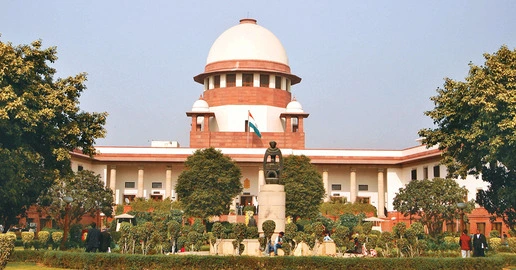The Supreme Court on Wednesday closed suo motu proceedings it had initiated against a judge of the Karnataka High Court for calling an apparently Muslim-dominated area in Bengaluru as Pakistan.
The five-judge Bench of Chief Justice of India DY Chandrachud, Justice Sanjiv Khanna, Justice BR Gavai, Justice Surya Kant and Justice Hrishikesh Roy closed the proceedings against Justice Vedavyasachar Srishananda of the Karnataka High Court, who was embroiled in a controversy after he made some objectionable remarks during a judicial proceeding.
The top court of the country had taken sou motu cognisance of the matter on September 20 and sought a report from the Registrar General of the Karnataka High Court after two videos of Justice Srishananda went viral on social media.
In one of the videos, Justice Srishananda referred to an apparently Muslim-dominated area in Bengaluru as Pakistan, while in the second, he allegedly made objectionable remarks to a woman advocate in a matrimonial dispute.
Expressing its displeasure over Justice Srishananda calling a particular locality of Bengaluru as ‘Pakistan,’ the Court said no part of India should be termed as Pakistan, since it was fundamentally contrary to the territorial integrity of the nation.
After the intervention of the Supreme Court over the viral video clips, Justice Srishananda apologised in open court on September 21, stating that certain observations made by him, which were unintentional and not intended to hurt any individual or section of the society, were quoted out of context.
The High Court judge said he was tendering an apology to any individual or section of the society directly or indirectly hurt by his comments.
The Apex Court today said that bearing in mind the contrived apology tendered by the judge of the High Court in the course of open court proceedings, it has decided not to pursue the proceedings further in the interest of justice and dignity of justice.
It cautioned the judges to express restraint, particularly in the age of electronic media where there was wide reporting of judicial proceedings.
The Bench recorded in its order that casual observations made by a judge during proceedings may well reflect a certain degree of individual bias, particularly when they were likely to be perceived as being directed against a particular gender or community.
The courts need to be careful and avoid passing comments in the course of judicial proceedings, which may be construed as being misogynistic or prejudicial to any segment of society, it added.
After perusing the report sent by the Registrar General of the Karnataka High Court, the Bench noted that the observations made by Justice Srishananda were unrelated to the subject matter.
The Bench further noted that after it took suo motu cognisance of the matter, the Registrar General of the High Court extracted the statement of regret expressed by the judge in the open court on September 21.
Since the High Court judge was not a party to the proceedings, the Bench said it would desist from making any further observations, except expressing serious concern about both the reference to gender and to a segment of the community.
The perception of justice to every segment of society was as important as the rendition of justice as an objective fact, observed the Apex Court, adding that such observations were liable to be construed in a negative light, thereby impacting not only the court of the judge who passed the remarks but also the wider judicial system.
The Bench said it hoped and expected that the demands placed on all stakeholders in the judicial system in the electronic age would elicit an appropriate modulation of behaviour, both on the part of the Bench, as well as the bar.
It further recorded in its order that the heart and soul of adjudication were impartiality and fairness. All stakeholders of the judiciary must be guided by only the values enshrined in the Constitution.
It was intrinsic for every judge to be aware of his/her own predispositions because it was only on the basis of such awareness that he/she could remain truly faithful to the fundamental obligation of a judge to deliver objective and fair justice, noted the Bench.
After the commencement of the suo motu proceedings, the CJI told Attorney General R Venkataramani and Solicitor General Tushar Mehta that the report from the Karnataka High Court was received regarding the incident.
Handing over the report to the AG and the SG for their perusal, the CJI said he had seen the clippings and was wondering if it could be taken up in chambers instead of the judicial side.
The AG said that he had a word with members of the Karnataka High Court, adding that if a larger issue was made out, it may have other ramifications.
The SG submitted that since Justice Srishananda has expressed regret for the remarks, the matter should be put at rest.


